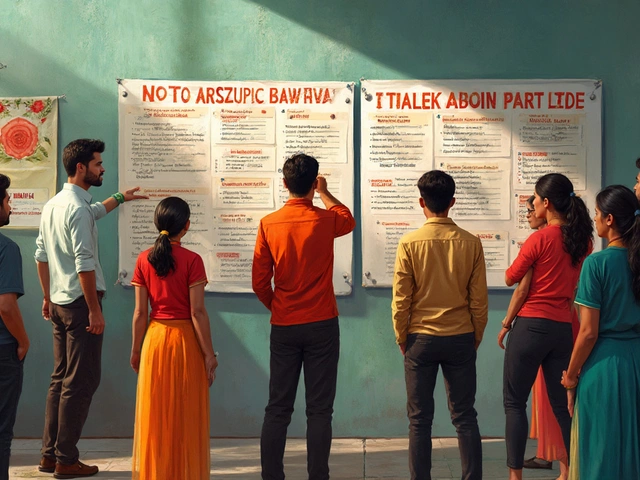Mathematics has long held a space in the world of academia that both fascinates and frustrates. Among the pantheon of math exams, only a few have earned a reputation for being seemingly insurmountable. These exams are designed not just to challenge, but to push the very boundaries of problem-solving and analytical thinking.
Throughout the history of academic testing, certain math exams have emerged as the touchstones of difficulty, attracting geniuses from around the globe eager to prove their mettle. But what makes these exams so daunting? It's a blend of complex concepts, intricate problems, and the high level of competition that sets them apart.
This article dives into what constitutes the hardest math exams in the world and examines their implications on both student careers and broader academic landscapes. Join us as we unravel the mysteries behind these formidable challenges.
- Defining the World's Hardest Math Exam
- Historical Significance and Origins
- Renowned Challenges and Problems
- Impact on Academic and Professional Paths
- Preparation Tips and Strategies
Defining the World's Hardest Math Exam
Pinpointing the world's toughest math exams involves diving deep into a sphere where logic, patterns, and intricate problem-solving converge. Historically, certain examinations have risen to prominence due to their jaw-dropping complexity. Among these, the International Mathematical Olympiad (IMO), often cited by educators and students alike, stands out. Held annually since 1959, the IMO brings together the brightest high school mathematicians to tackle profoundly challenging problems. Each year, youths from over 100 countries compete, with many enduring years of preparation. The IMO's difficulty doesn't stem from the necessity of advanced knowledge, but rather its demand for creativity and exceptional analytical skills.
An even more daunting challenge lies within the mathematical feats posed by the William Lowell Putnam Mathematical Competition. Established in 1938, the Putnam exam is distinctive for its merciless grading scale. Out of a possible 120 points, participants average just a single digit score. This underscores the Putnam's aim: not merely testing students' grasp of math concepts, but pushing the envelope of their intellectual curiosity and perseverance.
For professional mathematicians, however, there's another arena entirely—the Fields Medal recognizes those who have tackled problems of significant complexity in mathematics. It's often deemed more prestigious than a Nobel Prize in this field. The problems tackled by medalists throughout their careers, and often highlighted during the award, are akin to exams in themselves, demanding years of dedication.
Global Reputation and Impact
Known for their high stakes, both the IMO and Putnam have nurtured the reputations of many mathematical prodigies. Participants often go on to academia or influential roles in technical fields. This reflects a broader truth: excelling in such competitions often indicates not just technical prowess, but an unwavering dedication to learning and a unique approach to problem-solving.
"Examinations at this level are more a test of your creative power and your courage to tackle the unknown than a test of memorized formulas or theorems." - Terence Tao, 2006 Fields Medalist.These contests have ground-breaking impacts on academic and professional paths, marking a rite of passage for many aspiring mathematicians. They foster a community united by a shared love for complex challenges and intellectual discovery.
Competitive exams like these don't just test knowledge—they shape future pioneers of science and mathematics. They challenge assumptions, promote innovation, and continue to inspire those who strive to push the boundaries of what's possible in mathematics. Behind every question in these exams lies a story of challenge, dedication, and ultimately, the triumph of human curiosity.
Historical Significance and Origins
The most challenging math exams in existence today have deep roots. These origins provide a window into not just the intellectual demands, but the values and ambitions of their creators. Take, for instance, the International Mathematical Olympiad (IMO), which launched in Romania in 1959. Its establishment aimed to foster a deeper cross-cultural exchange among young mathematicians during a tense geopolitical climate. Behind the IMO was a vision to establish a competitive platform where brilliance was not bound by borders or politics—a place where the world's young minds could unite through their shared passion for problem-solving.
As the years unfolded, the IMO's prestige grew. It continues to encourage students worldwide to embark on this challenging, yet rewarding journey. These exams represent more than academic milestones; they capture a global aspiration to push human potential to its limits. But the IMO is just one example. In the more academic realm, the Putnam Competition stands prominent in North America. Originating in 1938, this examination draws university students across the continent, prompting them to solve problems that border on the arcane and fantastical. Its inception was a means of encouraging pure mathematical thought among undergraduates at a time when applied sciences were rapidly expanding.
The British Mathematical Olympiad offers another angle, stemming from the United Kingdom's desire to participate in an increasingly competitive international landscape. Founded in the 1960s, it was initially a domestic event aimed at identifying and nurturing mathematical talent; however, it quickly expanded to serve as a key training ground for international competitions like the IMO. Each exam reflects its own history and cultural derivation, yet they unify in endeavor: cultivating a deep, systemic understanding of mathematics.
An interesting historical footnote is the Cambridge Mathematical Tripos in England, notorious for its rigorous nature. Starting in the early 18th century, it evolved over time, posing a unique blend of challenges that determined a student’s standing not just regionally, but globally. It was said that Charles Phelps Smyth, an English scholar, once remarked,
'The Tripos is not just an exam, it is a rite of passage for those destined to push the boundaries of knowledge.'This illustrates how math exams extend beyond mere academic exercises; they're symbolic of an intellectual quest, earning reputations as stages for the world’s best to showcase prowess.
These exams’ evolution is marked not merely by increasing difficulty but by their adaptation to emphasize creativity and new methodologies. As the challenges morphed, so too did the aspirations of those who sat them. This historical journey from local academic offerings to a global intellectual pursuit highlights the universal human drive to seek the unknown, to embrace challenge, and to transcend current understanding through brilliance and perseverance. Aspiring mathematics leaders from different generations still hear the call of these storied exams, beckoning them to etch their names into the timeless ledger of mathematical achievement.

Renowned Challenges and Problems
Among the daunting math exams worldwide, a few stand out for their fierce reputation in difficulty. The International Mathematical Olympiad (IMO) is perhaps the first name that springs to mind. This annual event draws high school students from over a hundred countries, transforming them into fierce competitors deciphering problems that are far from textbook exercises. The IMO’s questions stretch well beyond the standard curriculum, pushing young minds to explore new territories. These questions usually cover number theory, geometry, combinatorics, and algebra, often requiring inventive solutions.
Another fierce competitor in the realm of challenging exams is the Putnam Competition, a North American undergraduate contest hosted annually. Famous for its brutal difficulty, the Putnam excels at separating the wheat from the chaff. Its problems are not merely about getting the answer right but involve reasoning and elegance in the solution process. In fact, the median score in the competition tends to be zero, owing to its challenging nature and the unique blend of mathematical reasoning it demands.
The list of notorious math exams cannot be complete without mentioning the Cambridge University Mathematical Tripos. Considered one of the toughest undergraduate mathematics exams in the world, the Mathematical Tripos has a storied history of creating intellectual giants. Graduates who have excelled at the Tripos include famed mathematicians like G.H. Hardy and Bertrand Russell. This three-part examination, spanning several years, demands a deep level of understanding and breadth in mathematical knowledge.
Highlighting these experiences, there's a famous remark by Paul Erdos, a legendary mathematician, that underscores just how mentally taxing these contests can be. Observing their complexities, he once quipped,
"A mathematician is a device for turning coffee into theorems."The exams demand rigorous mental gymnastics and, perhaps, abundant caffeine consumption.
While these exams are daunting, they are also milestones for many students dreaming of careers in academia and research. Success in these exams can open doors to prestigious universities and scholarships, setting a foundation for a prosperous future. Understanding how to tackle these demanding tests is crucial. For students aspiring to take them, it's not just about rote memorization but nurturing a passion for problem-solving. Engaging with complex puzzles recreationally, joining math clubs, and learning problem-solving techniques are crucial steps in cracking these formidable exams.
Impact on Academic and Professional Paths
Those who tackle the world's toughest math test are opening doors to a variety of academic and professional opportunities. Success in these exams is often viewed as a hallmark of excellence, elevating resumes in competitive fields like finance, engineering, and data science. Institutions around the globe, including Ivy League universities and top-tier technical institutes, highly regard candidates who have excelled in such rigorous assessments. They recognize that attempting these exams not only requires mastery of complex mathematics but also discipline, perseverance, and an innovative mindset.
On an academic level, achieving high scores in these exams can lead to prestigious scholarships and acceptance into specialized programs focused on advanced math and science research. It's not just about memorizing formulas; these tests prioritize creative problem-solving skills which are critical for research-based roles. In fact, many groundbreaking discoveries stem from the fertile minds of individuals who have excelled in such competitive environments. Often, these exams serve as a springboard for budding mathematicians, providing them with the confidence to take on research in uncharted territories.
Professionally, the recognition from conquering a renowned math exam gives candidates a distinct edge in the job market. Employers, especially within tech and STEM industries, value the analytical skills and mental acuity that exam success demonstrates. As one technology executive put it, "We often look for candidates who have proven themselves through challenging assessments, as they bring a level of problem-solving ability that is crucial to our innovations." The emphasis on these problem-solving skills often leads to accelerated career advancement within technical and strategic roles.
Additionally, these exams can influence the professional trajectory by fostering a lifelong love of learning and self-improvement. Engaging with the challenging material necessitates a deep curiosity and persistence which invariably bleeds into personal and professional habits. It's not uncommon for those who've taken these exams to branch into entrepreneurial ventures or advisory roles where their unique insights into complex problems can offer tangible benefits. Such roles often appeal to those who thrive on challenging themselves intellectually and continuously honing their crafts.
"Mathematics is, in its way, the poetry of logical ideas," said Albert Einstein, encapsulating the enduring allure of math at its highest levels.A successful journey through these perilous waters of challenging exams might sometimes lead beyond traditional paths. Some individuals use their experiences to inspire and educate others, either through teaching or creating innovative educational content. In doing so, they contribute to the growth and dynamism of educational methods, often reshaping how mathematics is perceived and taught, ensuring future generations are better equipped for the rigors of such examinations.
For those involved in academia or industry, conquering the most renowned math problems can be a testament to one's capabilities, setting them apart in a world that highly values problem-solving prowess. It's a journey that shapes not only careers but also alters personal ethos, leaving an indelible mark that continues to influence long after the victory is claimed.

Preparation Tips and Strategies
Preparing for an exam that ranks among the toughest in the world requires a meticulous and well-structured approach. One cannot merely rely on rote memorization or regular study habits—the stakes are too high, and the problems too complex. It's about honing one’s ability to think creatively and apply concepts in novel ways. To begin with, creating a study plan is crucial. This should include timelines for covering different topics, setting aside time for practice tests, and regular reviews. An organized approach ensures no stone is left unturned and enables more efficient learning progress tracking.
As a first strategy, immersing oneself in problem-solving is fundamental. Engaging with problems from past papers offers a dual benefit: familiarity with the format and recognition of recurring problem patterns. Consider that such exams often repeat the style, if not the exact problems. Hence, another effective method is to form or join study groups. Discussing problems and exchanging ideas with peers can lead to breakthroughs, as different perspectives can illuminate problems in ways one might not have considered. A balance of solitary and collaborative study can optimize learning.
Leveraging Resources
Making full use of available resources can bridge the gap between understanding and mastery. Books, online platforms, and lecture notes can diversify the learning experience. In addition, accessing content like math Olympiad training resources can be particularly beneficial. These resources often include explanations and walkthroughs that can aid in demystifying some of the more obtuse problems. Remember, some educational programs offer workshops or boot camps specifically designed for challenging math exams. Attending these can provide structure and expert guidance.
It’s also important to focus on the psychological aspects of preparation. Stress management techniques such as mindfulness or meditation exercises can maintain mental equilibrium. Competitive exams, known for their intense pressure, require both mental and emotional endurance. Practicing these techniques helps maintain a calm demeanor during examination scenarios. Additionally, ensure that you set realistic goals and rewards. This kind of positive reinforcement keeps motivation levels high.
“The mind is not a vessel to be filled, but a fire to be kindled.” – Plutarch
Mock Exams and Review
Never underestimate the power of practice exams. These should be stringent, simulating real exam conditions as closely as possible to build stamina and concentration. Post-exam review sessions are vital and can be an illuminating part of your preparation journey. Analyze mistakes thoroughly and derive lessons from them. This process of constant feedback helps identify weak points and areas that need improvement.
Lastly, maintaining balance is key. A disciplined approach to studying, paired with regular breaks and a healthy lifestyle, can lead to more effective learning. Nutrition, exercise, and sleep must not be neglected, as they are integral to maintaining brain function at optimal levels. Remember, preparing for the world’s hardest math exam is a marathon, not a sprint.





